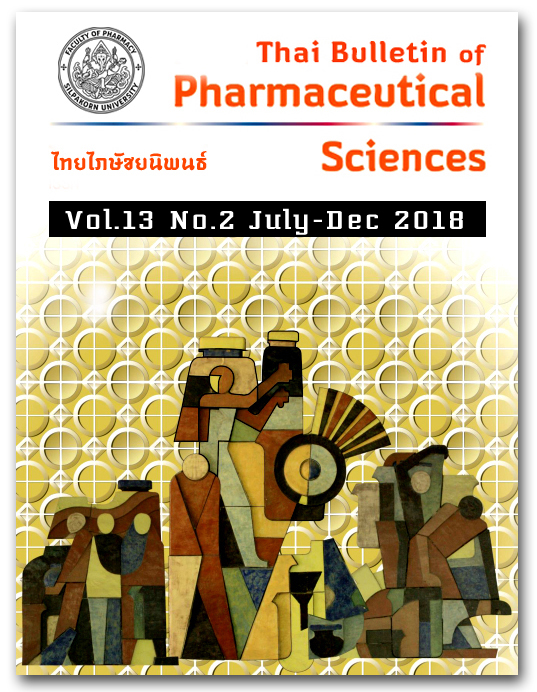การประเมินการใช้ยารักษาผู้ป่วยภาวะหัวใจล้มเหลวเรื้อรัง ณ โรงพยาบาลหัวหิน
DOI:
https://doi.org/10.69598/tbps.13.2.163-171คำสำคัญ:
ภาวะหัวใจล้มเหลวเรื้อรัง, การประเมิน, แนวทางการรักษาแนะนำบทคัดย่อ
ภาวะหัวใจล้มเหลวเรื้อรังเป็นปัญหาสาธารณสุขที่สำคัญของประเทศไทย เนื่องจากมีอัตราการตายสูงและต้องสูญเสียค่าใช้จ่ายในการรักษาพยาบาลจำนวนมาก ดังนั้นการใช้ยาที่เหมาะสมตามแนวทางการรักษาจึงมีความสำคัญเป็นอย่างยิ่ง การศึกษานี้เป็นการศึกษาเชิงพรรณนาแบบเก็บข้อมูลย้อนหลัง โดยมีวัตถุประสงค์เพื่อประเมินการใช้ยารักษาผู้ป่วยภาวะหัวใจล้มเหลวเรื้อรังที่มีค่าการบีบตัวของหัวใจห้องล่างซ้ายน้อยกว่าร้อยละ 40 เทียบกับแนวทางการรักษาภาวะหัวใจล้มเหลวเรื้อรัง ณ โรงพยาบาลหัวหิน วิเคราะห์ข้อมูลโดยใช้การทดสอบไค-สแควร์ จากการรวบรวมข้อมูล มีผู้ป่วยภาวะหัวใจล้มเหลวเรื้อรังที่มีค่าการบีบตัวของหัวใจห้องล่างซ้ายน้อยกว่าร้อยละ 40 จำนวน 51 ราย ผลการศึกษาพบว่า รายการยาที่สั่งใช้มากที่สุด 3 อันดับแรกคือ ยากลุ่ม loop diuretics ร้อยละ 92.2 ยากลุ่ม beta blockers ร้อยละ 56.8 และยากลุ่ม ACEIs หรือ ARBs ร้อยละ 52.9 ตามลำดับ นอกจากนี้ยังพบว่า ผู้ป่วยได้รับยากลุ่ม ACEIs หรือ ARBs ร่วมกับ beta blockers ร้อยละ 29.4 ยากลุ่ม ACEIs หรือ ARBs ร่วมกับยากลุ่ม beta blockers และ mineralocorticoid antagonist ร้อยละ 17.6 ซึ่งสอดคล้องกับแนวทางการรักษาภาวะหัวใจล้มเหลวแนะนำ โดยพบว่าผู้ป่วยกลุ่มนี้มีแนวโน้มของการกลับมารักษาซ้ำในโรงพยาบาลด้วยภาวะหัวใจล้มเหลวกำเริบน้อยกว่ากลุ่มที่ได้รับยาไม่เหมาะสมเมื่อเทียบกับแนวทางการรักษา
เอกสารอ้างอิง
2. Loehr LR, Rosamond WD, Chang PP, Folsom AR, Chambless LE. Heart failure incidence and survival (from the Atherosclerosis Risk in Communities study). Am J Cardiol. 2008;101:1016–22.
3. Roger VL, Weston SA, Redfield MM, Hellermann-Homan JP, Killian J, Yawn BP, et al. Trends in heart failure incidence and survival in a community-based population. JAMA. 2004;292(3):344-50.
4. Moleerergpoom W, Hengrussamee K, Piyayotai D, Jintapakorn W, Sukhum P, Kunjara-Na-Ayudhya R, et al. Predictors of in-hospital mortality in acute decompensated heart failure (Thai ADHERE). J Med Assoc Thai. 2013;96(2):157-64.
5. Allen LA, Fonarow GC, Liang L, Schulte PJ, Masoudi FA, Rumsfeld JS, et al. Medication initiation burden required to comply with heart failure guideline recommendations and hospital quality measures. Circulation. 2015;132(14):1347-53.
6. Yoo B, Oh J, Hong B, Sjom D, Bae J, Yang D, et al. Survey of guideline adherence for treatment of systolic heart failure in real world (SUGAR): A multicenter, retrospective, observational study. PLOS ONE. 2014;9(1):1-7.
7. Poelzla G, Altenbergerb J, Pacherc R, Ebnerd C, Wiesere M, Winterf A, et al. Dose matters! optimization of guideline adherence is associated with lower mortality in stable patients with chronic heart failure. Int J Cardiol. 2014;175(1):83-9.
8. Cowie MR, Mosterd A, Wood DA, Poole-Wilson PA, Sutton GC, Grobbee DE. The epidemiology of heart failure. Eur Heart J. 1997;18:208–25.
9. Adams Jr KF, Fonarow GC, Emerman CL, LeJemtel TH, Costanzo MR, Abraham WT, Berkowitz RL, Galvao M, Horton DP. ADHERE Scientific Advisory Committee and Investigators. Characteristics and outcomes of patients hospitalized for heart failure in the United States; rational, design and preliminary from the first 100,000 cases in the acute decompensated heart failure national registry (ADHERE). Am Heart J. 2005;149:209–16.
10. Piemsomboon C, Heangrussamee K, Songmuang, Poowanan S, Bauokansri A, Krityapong K, et al. Thai Heart Failure Guideline 2014.[cited 2018 Jan 9]. Available from: http://www.thaiheart.org/Thai_HF_Guideline_2014.
11. McMurray JJ, Adamopoulos S, Anker SD, Auricchio A, Bohm M, Dickstein K, et al. ESC guidelines for the diagnosis and treatment of acute and chronic heart failure 2012: The Task Force for the diagnosis and treatment of acute and chronic heart failure 2012 of the European Society of Cardiology. Developed in collaboration with the Heart Failure Association (HFA) of the ESC. Eur Heart J. 2012;33:1787–847.
12. Yancy CW, Jessup M, Bozkurt B, Butler J, Casey DE Jr, Drazner MH, et al. 2013 ACCF/AHA guideline for the management of heart failure a report of the American College of Cardiology Foundation/American Heart association task force on practice guidelines. J Am Coll Cardiol. 2013;62(16):147-239.
13. Komajda M, Lapuerta P, Hermans N, Gonzalez-Juanatey JR, Veldhuisen DJ, Erdmann E, et al. Adherence to guidelines is a predictor of outcome in chronic heart failure: the MAHLER survey. Eur Heart J. 2005;26(16):1653-9.
14. Jotkowitz AB, Porath A, Shotan A, Mittelman M, Grossman E, Zimlichman R, et al. Adherence to guidelines for patients hospitalized with heart failure: A nationwide survey. Isr Med Assoc J. 2006;8(12):875-9.



